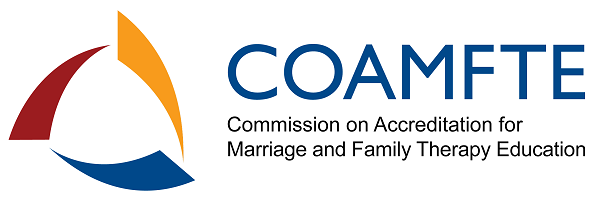
Licensure
Licensure & Accreditation

One of the many benefits of attending a COAMFTE* accredited program is that it simplifies the post-graduation licensure application in many states. In Washington State, graduates of COAMFTE accredited programs meet the education requirements for LMFT licensure and can count up to 500 hours of direct client contact earned from the program towards the 3,000 hours requirement to become fully licensed. Washington State law requires that people practice therapy under appropriate supervision as part of their post-master’s training requirements in preparation for full licensure (LMFT, view here). One hundred supervision hours earned from the program may also count towards the 200 supervision hour requirement for licensure. After graduating, students are prepared to begin clinical practice as Licensed Marriage and Family Therapy Associates (LMFTA) while working toward the full LMFT license.
In addition to the 3,000-hour supervised clinical experience, LMFTAs must pass the Association of Marriage and Family Therapy Regulatory Board (AMFTRB) Exam. Of MACFT graduates who have taken the exam, 100% have passed.
This Licensure Chart provides guidance on whether the education students receive at Seattle University's MACFT program will prepare them for the applicable licensing exam in a particular state.
Additionally the American Association for Marriage and Family Therapy (AAMFT) provides contact information for MFT Licensing Boards here, and the Association of Marriage and Family Regulatory Boards provides additional resources here.
*The Couples and Family Therapy Program at Seattle University’s College of Arts and Sciences is accredited by COAMFTE, 112 South Alfred Street, Alexandria, Virginia 22314, (703) 838-9808, coa@aamft.org.
Adapted from Seattle University's Licensure Disclosure:
Professional Licensure Disclosures
States vary in what is required to be licensed as a marriage and family therapist (LMFT) and how licensure is acquired. Some states might require that an individual simply graduate from an accredited program. Others might require individuals to obtain additional coursework, additional fieldwork, background checks, passage of additional state licensing exams, additional fees, or other requirements.
While students who graduate from Seattle University's MACFT will typically possess the minimum educational qualifications to apply for Washington licensure, this may not be the case for other U.S. states and territories.
Possible Changes to Requirements
While this page is reviewed and updated annually, state licensure requirements are subject to change. We strongly encourage you to check with the state licensing board where you intend to seek licensure and practice to confirm all licensing requirements; make sure you understand and consider the implications of the additional requirements prior to enrolling in a program intended to lead to professional licensure.
Relocating to Another State
Students must remain in Washington State throughout the duration of the program.